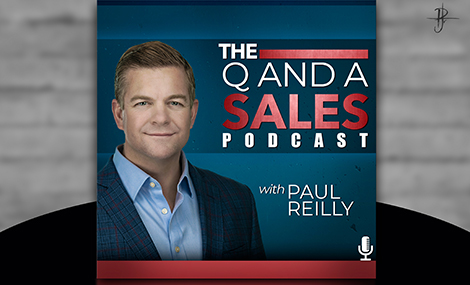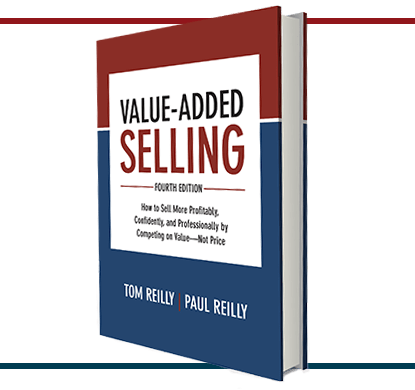Paul shares seven habits that will lead to your sales success.
Show Notes:
“Your results at the end of the day, the month, or the quarter directly relates to your habits.”
95% of top-achieving salespeople are doing this one thing, are you?
“If you embrace this one habit, you’ll have more business than you know what to do with…”
Debrief the call while it’s fresh in your mind. That was nothing will slip through the cracks.
Practice and visualize, just like Michael Jordan. Could you execute your sales call with your eyes closed?
Your results are a collection of your habits.
Click here to purchase the latest copy of Value-Added Selling!
***
Our show is updated weekly with the questions you ask. So, please go to the home page, subscribe, share it with your friends, but most importantly, ask the question that you want answered.
The Q and A Sales Podcast is edited by The Creative Impostor Studios. Book a complimentary consultation about your show at http://www.thecreativeimpostor.com/qanda
Thank you for tuning in. Make it a big day.
http://www.theqandasalespodcast.com
What are the best habits to embrace?
(Transcribed from podcast)
On today’s episode, we are going to talk about the best sales habits you should embrace. Now, remember, [I mentioned] probably three months ago… in our December public seminar, we had a new salesperson in this session and they were asking about habits. This is a common question we get, especially from newer salespeople that want to know the best habits to embrace. In sales, we all have good habits and we have some bad habits. So, we’re going to focus on some of those key habits in today’s podcast.
Now, a quick shout out to our sponsor. Value-Added Selling is now available on Amazon. We’re on the fourth edition of this book, and this book is filled with critical habits that you need to embrace as a salesperson. So make sure you pick up your copy. This is your go-to guide, your bible, for how to go out there and sell.
Also, a shout out to Andrea over at The Creative Impostor Studios. You know, we’ve talked a lot about starting podcasts and how the timing is perfect for it. As the economy starts to reopen, people are going to be driving more. There’s going to be more time to listen to podcasts. So, if you’ve considered starting one, now is the time to do it. Reach out to Andrea and her team and they are going to guide you right along.
So with that being said, let’s get started with today’s show. We think about our habits as salespeople. Our results that we see at the end of the day, at the end of the month, end of the quarter… they’re really just a result of what we do on a daily basis. What we do on a repeated basis are habits. And so, it’s important that we embrace positive habits in sales.
Now, the challenge that we face is that we don’t see results right away. That’s one of the biggest challenges. And when we don’t see the results, we end up stopping and we revert to our old habits. Here are good habits that you should make part of your daily routine that will help keep you on the right track. We’re going to give you seven of them today.
The first one is pretty straight forward and you’ve heard me say this before—plan every single sales call that you go on. Our research shows that 95 percent of top achievers routinely plan every call. This is a habit that you must embrace. This is almost that one common thread that we’ve seen among all top achieving salespeople. You don’t necessarily have to be good at it, you just have to do it. It’s one of those things that requires zero talent on your part. So, make sure you plan every single call.
Habit number two: Talk to three new opportunities every single day. I talk to so many salespeople that struggle to fill their pipeline with opportunities. They’re not sure how to hit their quota. And I always ask them, “How much prospecting are you doing? How many people are you reaching out to on a daily basis?” What we know about top achievers, they have a steady flow of new opportunities coming in. This is a tip that my dad gave me early on in my sales career. He said, “If you talk to three people every single day about a new opportunity, you’re going to have more business than you know what to do with.” Use that as your benchmark. That’s your guide. Again…three new opportunities every single day.
The third habit we need to embrace: debrief immediately after every single sales call. Whether it’s a phone call, whether it’s a face to face visit, as soon as you are finished with that call, take some time, write down notes, log it into your CRM, whatever you need to do. The key is, all the information you discussed is going to be fresh in your mind. This is your best chance for things to not slip through the cracks let’s say. You need to be conscientious and thorough in your follow-up. And, in order to do that, it means you’re going to have to debrief immediately after every single call. So make sure you’re doing that.
Number four: practice the sales call. Actually visualize what it’s going to look like. I’m thinking about this… I was watching Michael Jordan’s new series, The Last Dance, just like everyone else is. I remember one of my favorite memories with Michael Jordan is when he would close his eyes and take a free throw. He would often visualize the ball going in the hoop before he would shoot. And he actually did it in a game one time. Many of you probably remember that. But Jordan would visualize his success before it happened. That’s kind of like practicing the sales call before you go in there. Think about it, if you have a meeting coming up with one of your prospects, it’s important that you not only prepare for the call and you plan it out, but you also have to practice it. You have to practice asking the right questions. You have to imagine different scenarios how that will play out. You have to practice your presentation, key words. So make sure you’re practicing, visualizing that success.
Tip number five: You have to plan your week. But I don’t recommend planning every hour of every day, all week long. Plan half your day. When you think about it, things happen throughout the day, and we have to be flexible. We have to be flexible to take advantage of opportunities when they present themselves. But you have to plan about half of your day. With that being said, you want to figure out your most productive times of the day. For me, I’m definitely a morning person and a mid-afternoon person. Those are my two most productive parts of the day. That’s where I plan my most important activities. You should do the same. As a salesperson, you want to plan your revenue producing activity during the most important [productive] parts of your day. Plan every day (plan about half of it) and guard your peak productivity times as revenue producing times. So you have prospecting time, you have a customer retention time. Everything else should be secondary, so you plan about half the day.
Number six: Follow up after every single meeting. Whether it’s a brief five minute introduction, or whether it’s a 30 minute call with one of your best prospects, after every single interaction, it’s critical that you send a follow-up note (whether it’s an email, whether it’s an actual written letter), but send a brief follow-up that highlights the next steps—the promises that you made—and then, how you’re going to deliver on those. Whether it’s following up with a piece of information, whether it’s following up with another meeting, those follow-up notes are critical because it shows that you’re thorough and that you manage the details. And also, what’s important with follow-up… I love follow-up because you get to make a promise to the customer or the prospect. You’re promising them that you’re going to send them some information, or you promise them that you’re going to follow up in a couple of weeks. You get to make a promise. And because you’re making a promise, you then have the opportunity to keep it. Every time you make a promise and then you keep it you’re starting to build trust and rapport with that customer or with that prospect.
And then point number seven: Every single week, review your pipeline of opportunities. Review and purge. That means that every single week, you look at the deals that you have pending; you look at the deals that you have coming into your pipeline, and you ask yourself, “Where are we with these deals? Are we still moving them forward? What are the next action steps that need to happen?” And also, if the deal is dead, admit it, purge it, get it out of there. Too often, salespeople like to keep pipe-dream opportunities in their pipeline. They do this because they don’t want to admit that it’s not going to happen. And now they’ve got to find a new opportunity to backfill it. So every single week, make sure you’re reviewing your pipeline; and make sure you’re purging opportunities. And also, when I say purging opportunities, that’s not just because you’re losing them. It’s also because you’re winning them. When you win a deal, it’s important to celebrate that success. But it’s equally important to forget about it, because you need to find a new one to replace the one that you just closed. So review your pipeline every single week.
Just to recap, seven habits that every salesperson should embrace:
- Plan every call.
- Three new opportunities every day. Make sure you talk to three new opportunities Every. Single. Day.
- Debrief immediately after every single sales call.
- Practice the sales call. Visualize it just like Jordan when he’s closing his eyes and making a free-throw.
- Plan half your day and make sure that you’re guarding your most productive time for prospecting and customer retention.
- Make sure you send a follow-up note to every prospect and customer that you meet with, or that you have a phone call with. Again, it shows that you’re thorough.
- Review your pipeline every single week.
Alright, salespeople, make it a big day.


